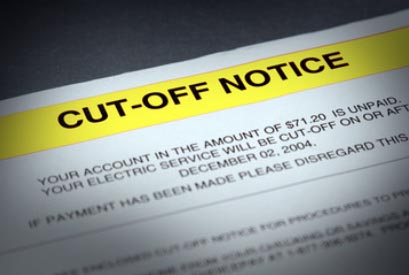Clean Water is a Human Right
Continuing the conversation about the dilemma of people not paying their water bills, we pick up on the topic of shutoffs, where utilities simply turn off the spigot to non-paying customers.
Obviously, and for good reason, shutoffs are very controversial, as the loss of water service may, in turn, result in the loss of habitability of one’s home. This could potentially lead to increased homelessness in the community with added costs to the community’s social service network, as well as to the water utility itself according to a 2019 AWWA report. The AWWA policy recommends that “discontinuance of water service for nonpayment is considered a final phase of a collection procedure and should be instituted with sufficient notice when all other reasonable alternatives, such as payment plans or specific customer assistance programs, have been exhausted.” The United Nations has determined that access to clean water is a human right. As humans with rights, we can probably agree that policies should be flexible, as we know that water is a necessity for maintaining our health, sanitary conditions in our homes, and may be required for life sustaining equipment.
The policy guidance is helpful in addressing the controversy of shutting off water, especially for a disadvantaged population, because there is no federal statute that ensures water for low-income residents. Likewise, there are no national standards to protect vulnerable populations (defined as children, elderly, disabled, pregnant women, and the ill) against the termination of water services due to default on payments. Notably, there is no national legislation that prohibits water utilities from disconnecting water service for nonpayment, nor any legislation that requires that a restricted level of water service, sufficient to maintain sanitary conditions, should be continued.
Does the Federal or State Government have a Solution?
However, this year, because of the COVID-19 emergency, two bills were introduced in the House of Representatives that prohibit water utilities from shutting off water service for nonpayment during the nationwide public health emergency. And, although these house bills are not yet enacted as national legislation, several states such as New York, Michigan and California have issued public health orders that prohibit water utilities from shutting off water during COVID-19. Some states have extended the repayment period for overdue bills, while others have suspended late payment fees.
Can We Benefit from Other Countries’ Efforts?
Although the United States has not yet enacted federal legislation, other countries have enacted legislation that would prohibit or provide guidance on restricting water service for nonpayment.
Auckland, New Zealand provides an example of how national regulation can be implemented. Watercare, the water utility in Auckland, stipulates their water restriction procedures in their Customer Contract. This contract states that “Watercare may respond to unpaid bills by restricting water supply (while maintaining an adequate supply for ordinary domestic, food preparation, and sanitary purposes as required by law)”. The restriction remains in place until the customer pays the amount due or agrees to a payment plan. With a restriction in place, the supply of water is reduced from 1 liter per second to 1 liter per minute, which is enough to maintain sanitary conditions. However, Watercare will not restrict in situations that would cause unsafe conditions or extreme hardship.
In Australia, the State legislatures have the power to enact laws on any matter, including water restrictions when bills are not paid. In most cases, the legislatures have enacted customer water service codes that specify the conditions in which a water provider can disconnect or restrict service for nonpayment. For example, the South East Queensland Customer Water and Wastewater Code specifies that a service provider may restrict/reduce the flow of water to a customer’s property if they have not paid a charge for the water service. And while they have authority to reduce the flow, they cannot reduce the flow below the prescribed minimum flow rate or completely shut off the supply to the customer. To offset these restrictions, some Australian utilities actually have financial hardship policies that provide support to customers when they are experiencing such hardships and find it difficult to pay their bills. Customers that qualify for the hardship policy are exempt from water supply restrictions. The hardship policies and early intervention strategies to help customers during hard times have been instrumental in reducing the number of restrictions for nonpayment.
In many European countries, disconnections are generally allowed if people don’t pay their bills. Typically, the disconnections only last for a few days, because, obviously, having no water is a strong incentive to get the bill paid. However, even though they are allowed, disconnections are used as a last resort and the letters sent prior to disconnection are usually enough to rectify the situation. If domestic households cannot afford to pay their bill, laws or contract agreements provide measures to allow for services to be maintained. And, in some European countries (Austria, France, Ireland, United Kingdom), legislation prohibits disconnection for nonpayment. In Hungary, reduction is the only option allowed.
What Should be the Next Step?
So, in the United States, is federal legislation the answer to this conundrum? Currently, each State and utility are unique in how they address affordability challenges. Should it be left up to each local utility or State legislature to adopt their own policies in addressing the impact of water shutoffs to low-income customers? Our recent experience with the COVID-19 public health emergency would seem to show that individual states have addressed the issue and are capable of enacting meaningful legislation that meets the needs of residents in that State.
If legislation that prohibits water disconnections for nonpayment is contemplated, the financial consequences to water utilities must be considered, as a suspension of water shutoffs may increase the number of delinquent accounts. The current coronavirus pandemic brings into sharp focus the need to look for new ways to address the priorities of providing water service to all customers and maintaining financial sustainability. These priorities may at first appear to be competing, but in the long run the best approach would be one that seeks to satisfy both objectives in the best way possible.
Written by: Frank Roth
Links to Part 1 and the White Paper
Part 1: https://swefc.unm.edu/home/no-money-for-water-part-1/
White Paper: https://swefc.unm.edu/home/resource/water-shutoff-alternatives-for-nonpayment-am/


Recent Comments